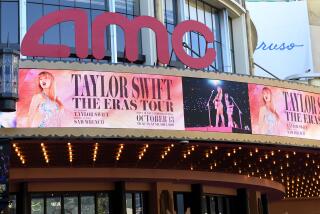With ‘The Trial of the Chicago 7,’ Netflix returns to movie theaters amid the pandemic
No major Hollywood institution has been better positioned to weather the coronavirus pandemic than Netflix. With theaters across the country shut down for months on end and studios scrambling to delay their most anticipated films, the streaming giant has enjoyed a virtually captive audience. Even as exhibitors have been plunged into an existential crisis, Netflix has enjoyed record boosts in global subscribers and a 30% jump in its stock price since mid-March.
But now, with a fall movie season like none before anxiously getting underway, Netflix is stepping outside its digital comfort zone and testing the waters of theatrical exhibition once again.
Except this time theaters are shut down in roughly a third of the country, including the major markets of Los Angeles, New York and San Francisco, and the biggest chains still refuse to book Netflix titles because the company flouts the traditional window between theatrical and home viewing.
Nevertheless, Netflix opens writer-director Aaron Sorkin’s period drama “The Trial of the Chicago 7” Friday in fewer than two dozen theaters in cities including Chicago, Philadelphia, Austin, Texas, and Tempe, Ariz. (In the Southland, it is expected to open next week at Regency’s Directors Cut Cinema in Laguna Niguel.) It’s the first phase in a larger expansion over the next three weeks, ahead of the film’s release on the streaming service on Oct. 16.
Such a rollout follows the playbook Netflix has used successfully with awards contenders like “Roma” and “The Irishman.” But this time, with many moviegoers hesitant to venture into theaters and exhibitors large and small hanging on by a thread, one significant question overshadows the strategy: Why?
With plans in flux just days before the film’s release, a Netflix representative declined to comment on the specific details of the rollout of “Chicago 7,” which Netflix acquired from original distributor Paramount Pictures this summer when the outlook for theaters appeared dire.
Sacha Baron Cohen, Jeremy Strong, Eddie Redmayne and Mark Rylance are among the ensemble of Aaron Sorkin’s sweeping historical drama “The Trial of the Chicago 7.”
The company typically keeps its cards close to its vest when it comes to its theatrical strategy and never reports box office figures for its films. But the platform release of “Chicago 7” represents a trial run for other awards contenders set to open in the coming months, including David Fincher’s period drama “Mank,” about the behind-the-scene battles during the making of “Citizen Kane,” and Ron Howard’s adaptation of the nonfiction bestseller “Hillbilly Elegy.”
While “Chicago 7” marks its highest-profile return to theatrical exhibition since the pandemic, Netflix has quietly dipped its toe back into theaters already. The thriller “The Devil All the Time” was released in a handful of theaters across the country on Sept. 11, a few days before it hit the Netflix platform on Sept. 16, while the gonzo Charlie Kaufman mind-bender “I’m Thinking of Ending Things” opened in a small number of theaters one week before it arrived via streaming on Sept. 4. (Notably, Netflix opted to bypass theaters entirely with its new high-profile mystery “Enola Holmes,” starring Millie Bobby Brown as the teenage sister of Sherlock Holmes, which is now available for streaming.)
Though its streaming-centric model remains anathema to the major theater chains like AMC, Regal and Cinemark, Netflix has long touted its support for theatrical exhibition and has developed partnerships with a number of independent theater owners and smaller chains like Landmark and Alamo Drafthouse. In the past year, the company also moved to acquire a pair of venerable movie houses in Los Angeles (the Egyptian Theatre) and New York (The Paris).
Over the last several years, Netflix has used the promise of a theatrical release, however limited, to help bring major filmmakers into its fold, from Alfonso Cuarón to Martin Scorsese to the Coen brothers. Speaking to The Times shortly before his film opened, Kaufman said that before the pandemic Netflix had planned a more robust theatrical release, and he had made the movie with that in mind: “Ideally, I would like the movie to be seen on as big a screen as possible. I think it’s a beautiful-looking movie. I hope people at least watch it on a big TV screen.”
Initial reviews for “Chicago 7” have been upbeat, and the film comes with considerable awards bona fides. A timely look back at the political tumult of the late 1960s and the notorious trial that followed the violence of the 1968 Democratic National Convention, the film boasts an impressive cast including Oscar winners Mark Rylance (as defense attorney William Kuntsler), Eddie Redmayne (as Students for a Democratic Society leader Tom Hayden) and nominee Frank Langella (as Judge Julius Hoffman).
“Borat” writing nominee Sacha Baron Cohen is also part of the ensemble, as are recent Emmy winners Yahya Abdul-Mateen II (“Watchmen”) and Jeremy Strong (“Succession”). (Some awards pundits have already speculated the cast may be too big for any performance to truly stand out.) Sorkin himself has been nominated three times for his screenwriting, winning adapted screenplay in 2011 for “The Social Network.”
Films made by and about women dominated the first-ever virtual Toronto International Film Festival, and our favorites include “Ammonite,” “Nomadland” and “One Night in Miami.”
Of course, nothing about this awards season is normal. Key fall festivals in Venice, Telluride, Toronto and New York have either been dramatically scaled back, gone virtual or been canceled outright. The critical taste-making cities of Los Angeles and New York, home bases both to the film industry and the media that cover it, have not reopened movie theaters and the exhibition industry continues to struggle nationwide.
Meanwhile, the film academy has pushed the date of the Oscars back by two months, to April 25, and relaxed its eligibility rules this year to enable films for the first time to qualify for Oscar consideration without a theatrical release.
For Netflix, in dogged pursuit of its first best picture Oscar, the awards derby ahead is filled with both promise and peril.
On the heels of the underperformance of Christopher Nolan’s “Tenet” from Warner Bros., major studios continue to appear wary of wide releases. Earlier this week, Disney pushed a key Oscar hopeful, Steven Spielberg’s new take on “West Side Story,” a full year to December 2021. Should the fall and winter bring a new surge in coronavirus cases, as many fear, smaller distributors like A24 and Sony Classics may also feel compelled to move more of their awards hopefuls out of harm’s way, making a clearer path for streaming services like Netflix.
Then again, even if the field of competition thins out, will general audiences have any interest in an Oscar race devoid of blockbuster theatrical titles à la “Joker,” “A Star Is Born” or “Black Panther” in recent years?
Amid so much anxiety, Netflix’s theatrical rollout of “Chicago 7” at least provides a hopeful green shoot in the otherwise fallow landscape of theatrical distribution. But it’s also a reminder that even for a company thus far shielded from the worst impacts of the coronavirus pandemic, there are trials ahead. And no matter where you look in the film ecosystem, the outlook remains far from certain.
More to Read
Only good movies
Get the Indie Focus newsletter, Mark Olsen's weekly guide to the world of cinema.
You may occasionally receive promotional content from the Los Angeles Times.











